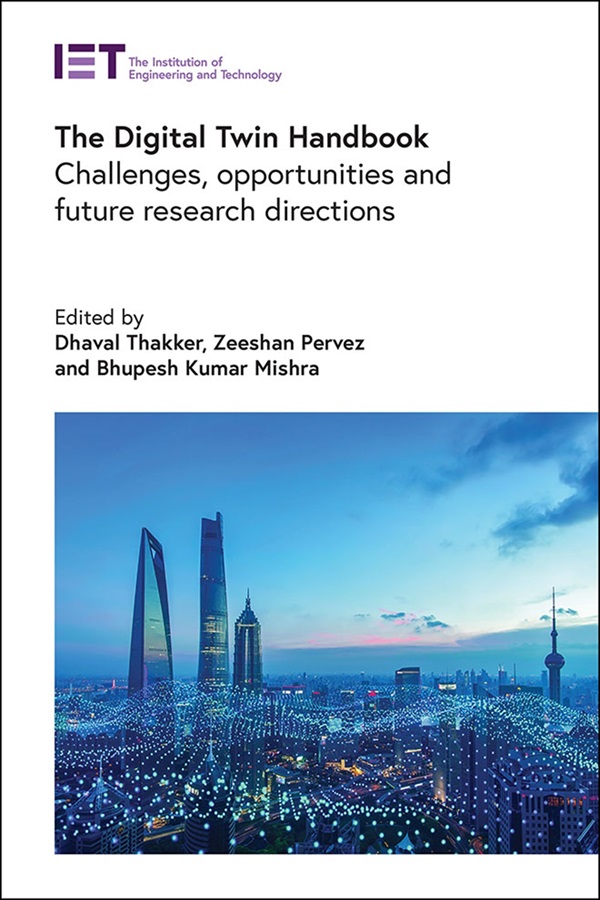- Agricultural Engineering and Technology
- Applied Physics
- Built Environment
- Computing and Networks
- Control, Robotics and Sensors
- Electrical Regulations
- Electromagnetics and Radar
- Energy Engineering
- Healthcare Technologies
- History and Management of Technology
- IET Codes and Guidance
- Manufacturing
- Materials, Circuits and Devices
- Model Forms
- Security
- Telecommunications
- Transportation

The Digital Twin Handbook
Challenges, opportunities and future research directions
Edited by Dhaval Thakker, Zeeshan Pervez, Bhupesh Kumar Mishra
A digital twin (DT) is a digital representation of a real-world physical product, system, or process. It is indistinguishable from its physical counterpart and used for simulation, integration, testing, monitoring and maintenance, often in real-time and in synchronization with the physical system. Digital twins offer the ability to gain a deep insight into the operating principles of any services, the interactions between different parts of the services and the behavioural aspects in a way that can be interactive and actionable for users and decision-makers.
DTs are now being implemented in many industries including the engineering design for smart cities, the built environment, manufacturing, robotics and healthcare. This enabling technology supports the development of connected environments in which sensing, monitoring, actuation and interventions are seamlessly choreographed to allow stakeholders to make data-driven, context-aware, and strategic decisions to better serve end users from the public and private and third sectors.
This edited book presents challenges, opportunities and solutions for the implementation of DT services along with their implementation experience. The book's main objective is to present a holistic view of the technological challenges, limitations and trends for enabling DT services. The authors will present challenging aspects of DT services that will identify the current and prospective potentials of DT application areas. This book will not only cover the technical aspects of DT services but also its benefits and future research directions and perspectives.
This comprehensive guide to the topic is intended to provide a holistic view for researchers, engineers and scientists in academia and industry working on digital twins and their application in smart cities, industry 4.0/5.0, and real-time monitoring. It will also be of interest to experts and developers who want to understand and realise the opportunities and challenges of using emerging techniques and algorithms for designing and developing digital twins.
About the Editors
Dhaval Thakker is a professor of AI and IoT and currently serves as director of research at the University of Hull, UK. He also acts as the University's Turing academic lead. He leads the Responsible AI Research Group, which focuses on safe, fair, and explainable AI solutions for high-stakes domains such as healthcare, law, defence, and energy. Since 2018, he has contributed to projects with a total awarded value of £12.8M.
Zeeshan Pervez is director of the Cyber Resilience and Artificial Intelligence Research Centre, and a professor of Cybersecurity at the University of Wolverhampton. He has a strong track record of successfully completing research, industry, and capacity-building projects. His areas of expertise include cybersecurity, applied ML/AI, internet of things, edge computing, and data analytics, with applications including cyber resilience, digital twins, industry 4.0, smart cities, predictive maintenance, facilities management, and healthcare.
Bhupesh Kumar Mishra is a lecturer in AI and Data Science at the University of Hull, UK. His research focuses on ethical, scalable AI solutions in healthcare, industrial optimisation, and environmental sustainability. With over seven years of experience in interdisciplinary research, he has secured competitive funding, published more than 30 high-impact articles, and received multiple best paper awards. He supervises doctoral and postgraduate researchers and actively contributes to CPD development, peer review, and conference leadership.
Publication Year: 2025
Pages: 349
ISBN-13: 978-1-83953-898-8
Format: HBK
Editors: Dhaval Thakker, Zeeshan Pervez, Bhupesh Kumar Mishra
